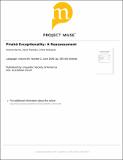| dc.contributor.author | Nevins, Andrew | |
| dc.contributor.author | Pesetsky, David | |
| dc.contributor.author | Rodrigues, Cilene | |
| dc.date.accessioned | 2015-02-19T16:19:29Z | |
| dc.date.available | 2015-02-19T16:19:29Z | |
| dc.date.issued | 2009-06 | |
| dc.date.submitted | 2008-08 | |
| dc.identifier.issn | 1535-0665 | |
| dc.identifier.issn | 0097-8507 | |
| dc.identifier.uri | http://hdl.handle.net/1721.1/94631 | |
| dc.description.abstract | Everett (2005) has claimed that the grammar of Pirahã is exceptional in displaying 'inexplicable gaps', that these gaps follow from a cultural principle restricting communication to 'immediate experience', and that this principle has 'severe' consequences for work on universal grammar. We argue against each of these claims. Relying on the available documentation and descriptions of the language, especially the rich material in Everett 1986, 1987b, we argue that many of the exceptional grammatical 'gaps' supposedly characteristic of Pirahã are misanalyzed by Everett (2005) and are neither gaps nor exceptional among the world's languages. We find no evidence, for example, that Pirahã lacks embedded clauses, and in fact find strong syntactic and semantic evidence in favor of their existence in Pirahã Likewise, we find no evidence that Pirahã lacks quantifiers, as claimed by Everett (2005). Furthermore, most of the actual properties of the Pirahã constructions discussed by Everett (for example, the ban on prenominal possessor recursion and the behavior of WH -constructions) are familiar from languages whose speakers lack the cultural restrictions attributed to the Pirahã. Finally, following mostly Gonçalves (1993, 2000, 2001), we also question some of the empirical claims about Pirahã culture advanced by Everett in primary support of the 'immediate experience' restriction. We conclude that there is no evidence from Pirahã for the particular causal relation between culture and grammatical structure suggested by Everett. | en_US |
| dc.language.iso | en_US | |
| dc.publisher | Muse - Johns Hopkins University Press | en_US |
| dc.relation.isversionof | http://dx.doi.org/10.1353/lan.0.0107 | en_US |
| dc.rights | Article is made available in accordance with the publisher's policy and may be subject to US copyright law. Please refer to the publisher's site for terms of use. | en_US |
| dc.source | Muse - Johns Hopkins University Press | en_US |
| dc.title | Pirahã Exceptionality: A Reassessment | en_US |
| dc.type | Article | en_US |
| dc.identifier.citation | Nevins, Andrew, David Pesetsky, and Cilene Rodrigues. “Pirahã Exceptionality: A Reassessment.” Language 85, no. 2 (2009): 355–404. © 2009 Linguistic Society of America | en_US |
| dc.contributor.department | Massachusetts Institute of Technology. Department of Linguistics and Philosophy | en_US |
| dc.contributor.mitauthor | Pesetsky, David | en_US |
| dc.relation.journal | Language | en_US |
| dc.eprint.version | Final published version | en_US |
| dc.type.uri | http://purl.org/eprint/type/JournalArticle | en_US |
| eprint.status | http://purl.org/eprint/status/PeerReviewed | en_US |
| dspace.orderedauthors | Nevins, Andrew; Pesetsky, David; Rodrigues, Cilene | en_US |
| dc.identifier.orcid | https://orcid.org/0000-0003-1530-9230 | |
| mit.license | PUBLISHER_POLICY | en_US |
| mit.metadata.status | Complete | |
